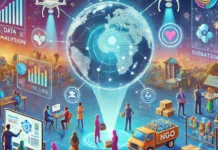Introduction
Artificial Intelligence (AI) is rapidly transforming industries across the globe, and the NGO sector is no exception. As NGOs strive to address complex social issues and drive impactful change, AI presents both exciting opportunities and significant challenges. From enhancing operational efficiency to improving program outcomes, AI has the potential to revolutionize how NGOs operate. However, its implementation also brings hurdles that need to be carefully navigated. This article explores the multifaceted challenges and opportunities of implementing AI in the NGO sector, shedding light on its transformative potential and the obstacles that organizations may face.
1. Understanding AI in the NGO Sector
Artificial Intelligence (AI) is becoming a game-changer for non-profit organizations, significantly enhancing their operations and impact. This section will delve into what AI means for NGOs and its current applications. We’ll explore how AI is revolutionizing the sector by improving efficiency, accuracy, and decision-making. From data analysis and predictive modeling to automation, AI is transforming how NGOs function and achieve their goals. Understanding these advancements will highlight how AI is boosting the effectiveness of non-profits and supporting their mission-driven work.
Definition and Scope of AI in NGOs
AI in the NGO sector involves using sophisticated technologies to streamline and enhance organizational operations. At its core, AI employs advanced algorithms and data processing to perform tasks that traditionally required human effort. This includes tasks such as data analysis, predictive modeling, and routine automation. By integrating AI, NGOs can make more informed decisions, optimize resource allocation, and gain deeper insights into the needs of their beneficiaries. Ultimately, AI empowers non-profits to operate more efficiently and achieve their goals with greater precision.
Current Applications of AI in NGOs
AI is making a significant impact on how non-profit organizations operate, providing innovative solutions that enhance their effectiveness and efficiency. This section explores various applications of AI in NGOs, showcasing its transformative potential through concrete examples.
Data Analysis and Pattern Recognition
One of the most prominent uses of AI in NGOs is data analysis. Machine learning algorithms can process vast amounts of data to uncover hidden patterns and trends. For example, the charity GiveDirectly utilizes AI to analyze data from field surveys and donor interactions. By identifying trends and predicting donor behavior, the organization can tailor its outreach strategies and improve fundraising efforts. Similarly, World Wildlife Fund (WWF) uses AI to analyze satellite imagery and monitor wildlife populations, helping them to better understand environmental changes and target conservation efforts more effectively.
AI-Powered Chatbots
AI-powered chatbots have become a valuable tool for NGOs, providing real-time support and information to beneficiaries. The United Nations’ World Food Programme (WFP) has implemented a chatbot named SCOPE that assists refugees and displaced persons in accessing food assistance. This chatbot answers queries, guides users through the application process, and provides updates on aid availability. By automating these interactions, the WFP can offer timely support and reduce the administrative burden on staff.
Predictive Analytics for Resource Allocation
Predictive analytics is another key application of AI in the NGO sector. By analyzing historical data and current trends, AI can forecast future needs and optimize resource allocation. For instance, Operation Smile uses AI to predict areas with the highest need for cleft palate surgeries. By analyzing demographic data and health records, the organization can plan missions more strategically and allocate medical resources where they are most needed. This proactive approach helps ensure that resources are used effectively and that interventions have a greater impact.
Enhancing Engagement and Outreach
AI is also enhancing how NGOs engage with their communities and stakeholders. For example, The Red Cross employs AI-driven sentiment analysis to monitor social media and gauge public reaction to their campaigns. This allows the organization to adjust its messaging and outreach strategies in real-time based on public sentiment. By understanding how their campaigns are perceived, the Red Cross can improve engagement and ensure their messages resonate with their audience.
Improving Operational Efficiency
Beyond specific applications, AI is streamlining various operational aspects of NGOs. Automating routine tasks such as data entry, reporting, and administrative processes frees up valuable time for staff to focus on strategic activities. For example, “charity: water” uses AI to automate the monitoring of water project data. This automation reduces manual labor, enhances data accuracy, and allows staff to concentrate on expanding their programs and reaching more communities.

These examples illustrate how AI is not only refining the operational processes of NGOs but also amplifying their overall impact. By leveraging AI technologies, non-profit organizations can enhance their efficiency, improve decision-making, and ultimately better serve their communities.
2. Challenges of Implementing AI in the NGO Sector
Implementing AI in the NGO sector brings significant benefits but also presents several challenges. Understanding these obstacles is crucial for non-profits looking to harness the power of AI effectively. This section explores the key challenges NGOs face when adopting AI technologies and offers examples to illustrate these issues.
High Costs and Budget Constraints
One of the most pressing challenges NGOs encounter is the high cost associated with AI technologies. The initial investment required for acquiring AI tools, as well as the ongoing costs for maintenance and upgrades, can be substantial. For example, a small NGO looking to implement an AI-driven data analysis tool may face costs exceeding $50,000 for software, hardware, and training. Given that many NGOs operate on tight budgets with limited financial flexibility, allocating funds for AI projects can be difficult. To overcome this challenge, NGOs need to clearly demonstrate the potential value and impact of AI investments. Creating detailed cost-benefit analyses and leveraging grants or partnerships with tech companies can help justify the expenditure.
Data Privacy and Security Concerns
Data privacy and security are critical issues when implementing AI in NGOs. These organizations often handle sensitive information about their beneficiaries, including personal and financial details. For instance, an NGO working with refugees might collect and store data related to their health and legal status. Ensuring that AI systems comply with data protection regulations, such as GDPR or HIPAA, is essential. This includes implementing robust security measures to prevent data breaches and maintaining transparency about data usage. NGOs must invest in secure data storage solutions, regular security audits, and staff training on data protection to address these concerns effectively.
Lack of Technical Expertise
The lack of technical expertise is another significant barrier to AI implementation in NGOs. AI technologies often require specialized knowledge and skills that many non-profits may not have internally. For example, setting up and managing an AI-based predictive analytics system may require data scientists and machine learning experts. Given that many NGOs rely on volunteers or staff with limited technical backgrounds, this expertise gap can be challenging. To address this issue, NGOs can partner with technology firms or academic institutions to gain access to the necessary skills and knowledge. Additionally, investing in training programs for existing staff can help build internal capacity for managing AI projects.
Integration with Existing Systems
Integrating AI with existing systems and processes can be complex and disruptive. Many NGOs use legacy systems that may not be compatible with modern AI technologies. For instance, an NGO using an outdated database system may struggle to integrate it with a new AI-driven data analysis platform. This integration challenge requires careful planning and may involve redesigning workflows to accommodate new technologies. NGOs need to manage the transition process efficiently to minimize disruptions and ensure that new AI tools work seamlessly with existing systems. Engaging in thorough system compatibility assessments and involving experienced IT professionals in the integration process can help mitigate these challenges.
In summary, while AI offers immense potential for NGOs, these challenges must be addressed to successfully implement and leverage AI technologies. By tackling issues related to cost, data privacy, technical expertise, and system integration, non-profits can unlock the transformative power of AI to enhance their operations and impact.
3. Opportunities of Implementing AI in the NGO Sector
Implementing AI in the NGO sector presents a range of opportunities that can transform how these organizations operate and achieve their goals. From boosting operational efficiency to enhancing program outcomes, AI technologies offer significant benefits. This section explores how AI can create positive changes in the NGO sector, providing concrete examples and insights into each opportunity.
Enhancing Operational Efficiency
AI has the potential to revolutionize the operational efficiency of NGOs by automating routine tasks and streamlining administrative processes. For example, AI-driven tools can automate data entry and report generation, significantly reducing the time and effort required by staff. This automation allows NGO employees to focus more on strategic activities and mission-critical tasks rather than getting bogged down with repetitive administrative duties.
Consider the example of an NGO that handles large volumes of donor data and reporting requirements. By implementing AI-based systems for data management and report generation, the organization can reduce the manual workload and minimize errors. This improvement not only saves time but also enables the NGO to allocate its resources more effectively. Moreover, AI can optimize scheduling and project management, leading to cost savings and more efficient use of resources.
Improving Program Outcomes
AI enables NGOs to analyze and interpret large datasets, leading to more informed decisions and improved program outcomes. For instance, machine learning algorithms can process impact data to identify which interventions are most effective. By analyzing patterns and trends, AI helps NGOs refine their strategies and enhance their impact.
A concrete example is an NGO focused on disaster relief. By using AI to analyze data from past relief efforts and ongoing assessments, the organization can predict where future needs are likely to arise and adjust its response strategies accordingly. This data-driven approach ensures that resources are deployed where they are most needed, improving the overall effectiveness of the intervention and maximizing the positive impact on affected communities.
Expanding Reach and Engagement
AI tools offer NGOs innovative ways to expand their reach and engage with a broader audience. AI-driven communication platforms, such as chatbots and personalized messaging systems, can provide timely information and support to beneficiaries. These tools enhance engagement by offering instant responses and tailored interactions.
For example, an NGO working in education could implement an AI-powered chatbot to provide students with information about available scholarships, application deadlines, and educational resources. This chatbot can interact with users 24/7, addressing their queries and guiding them through complex processes. Additionally, AI can analyze user data to deliver personalized content and recommendations, thereby increasing the organization’s visibility and effectiveness in reaching target communities.
Facilitating Data-Driven Decision Making
AI empowers NGOs to make more informed decisions by providing valuable insights from complex datasets. Predictive analytics, a key AI application, can forecast future trends and needs, allowing organizations to plan and strategize more effectively.
For instance, an NGO focused on public health might use AI to analyze health data and predict disease outbreaks. By leveraging these insights, the organization can develop targeted health interventions and allocate resources more efficiently. This data-driven approach enables NGOs to base their strategies on robust analysis rather than intuition, leading to more impactful and sustainable outcomes.
In summary, AI offers a range of opportunities for NGOs, from enhancing operational efficiency to improving program outcomes and expanding reach. By embracing these technologies, non-profits can transform their operations, engage more effectively with their audience, and make data-driven decisions that enhance their impact and sustainability.
Conclusion
AI holds significant promise for the NGO sector, offering opportunities to enhance efficiency, improve program outcomes, and expand reach. However, the path to successful AI implementation is fraught with challenges, including high costs, data privacy concerns, and integration issues. NGOs must navigate these hurdles thoughtfully while leveraging AI’s potential to drive meaningful change. By addressing these challenges head-on and harnessing the power of AI, NGOs can unlock new possibilities for advancing their missions and achieving greater impact.
For further reading, explore our series on AI applications in different sectors and discover how technology is shaping the future of various industries, including the NGO sector.
FAQs
- What are the main benefits of implementing AI in NGOs? AI can enhance operational efficiency, improve program outcomes, and expand outreach by automating tasks and providing data-driven insights.
- What challenges do NGOs face when integrating AI? Major challenges include high costs, data privacy and security concerns, lack of technical expertise, and difficulties in integrating AI with existing systems.
- How can NGOs overcome budget constraints for AI implementation? NGOs can consider partnering with tech firms, seeking grants, or using AI solutions tailored to smaller budgets to manage costs effectively.
- What measures should be taken to ensure data privacy when using AI in NGOs? NGOs should implement robust security protocols, comply with data protection regulations, and ensure transparency in data handling to safeguard privacy.
- How can NGOs acquire the technical expertise needed for AI projects? NGOs can invest in training for existing staff, collaborate with tech experts, or partner with educational institutions to bridge the expertise gap.



